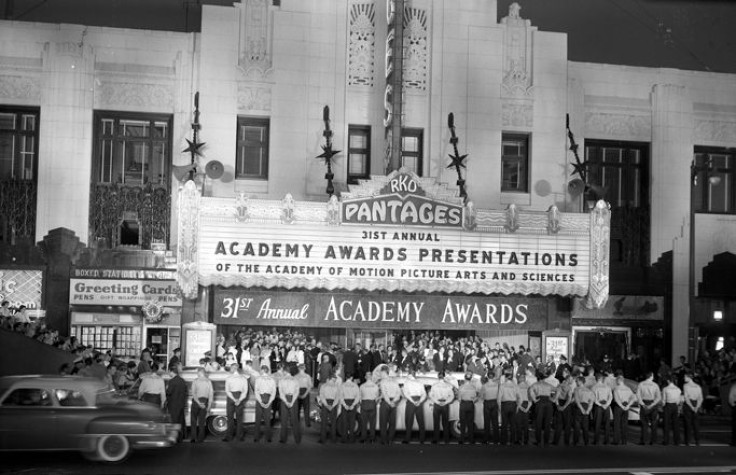Oscars Trivia: 19 Surprising Academy Awards Facts And ‘Firsts’ To Test Your Movie History Knowledge

So you consider yourself a bona fide movie buff, do you? Let’s put that Hollywood acumen to a test.
With the 86th annual Academy Awards airing Sunday, March 2, we thought we’d wet your awards night appetite with some trivia. Here are 19 surprising facts and “firsts” to probe your Oscars history knowledge.
1. What was the first color film to win best picture? The very first moving color images were made by British inventor and cinematographer Edward Raymond Turner in 1902. They featured segments of a girl on a swing, marching solders a macaw and a goldfish.
Hollywood produced its first feature-length film shot in color, “The Toll of the Sea,” in 1922. It starred Anna May Wong and Kenneth Harlan.
2. Who was the oldest actor to ever win an Oscar? The oldest Oscar nominee in awards history was Gloria Stuart, who played “Old Rose” in James Cameron’s “Titanic.” She was nominated in 1997 at the age of 87.
3. What year did the Academy replace the phrase “And the winner is…” with “And the Oscar goes to…?” Come on, everyone’s a winner, right?
4. What’s the only X-rated film to ever win an Oscar? The Motion Picture Association of America’s film-rating system began in November 1968. An “X” rating is reserved for Hollywood’s most explicit films. Some of the earliest films branded with an “X” were “A Clockwork Orange” (1971), “Last Tango in Paris” (1972) and “The Evil Dead” (1981)
5. Where was the very first Academy Awards ceremony held? The first Academy Awards was in 1929. The ceremony was a private dinner and lasted just 15 minutes. It was neither broadcasted nor televised.
6. Which actor is considered the Oscar’s most honored leading man? Hint: He has 12 nominations and three Oscar wins. His most recent win was in 1997.
7. Three Best Picture winning films are longer than three-and-a-half hours. Name them. “Best Picture” winners tend to have longer running times, but three of them are particularly lengthy.
8. Name the most Oscar-nominated family of all time. They have 87 nominations among them.
9. Who was the first actor to turn down a Best Actor award? The first person to refuse an Oscar was Dudley Nichols, the 1935 winner for his screenplay of “The Informer.”
10. What’s the first “viral” movie quote? Hint: The film came out long before the Internet was a thing.
11. What’s the Oscar statuette’s official name? It’s not Oscar, we swear.
12. Three actors have won Academy Awards for roles in which they didn’t utter a single word throughout the entire movie. Who are they? One played a deaf character, one played a mute “village idiot” and the other played a character who couldn’t speak.
13. What year did a streaker flashing the peace sign run across the Academy Awards’ stage? David Niven, the presenter at the time, humorously responded to the naked prankster: "The only laugh that man will ever get in his life is by stripping ... and showing his shortcomings.”
14. Who is the only actor ever nominated twice for the same performance? This person was nominated as both Best Actor and Best Supporting Actor for the same role. Current Academy rules prohibit this.
15. What are the only sequels to ever win Best Picture? There are two of them.
16. What Oscars ceremony was the longest in Academy Awards history? The ceremony lasted four hours and 18 minutes. Only three Oscars ceremonies have run longer than four hours.
17. Who is the youngest actor to take home an Oscar? Hint: She won for Best Supporting Actress in 1973.
18. Only a few Hollywood stars have won back-to-back Academy Awards -- that is, they took home an Oscar two years in a row. Name three of them.
19. During the very first Academy Awards ceremony, three awards were given that were never handed out again. What were they?
ANSWERS: 1. “Gone with the Wind” (1939), 2. Jessica Tandy, for “Driving Miss Daisy,” in 1989. She was 81. 3. 1989 at the 61st Academy Awards, 4. “Midnight Cowboy” (1969), 5. Hollywood Roosevelt Hotel, 6. Jack Nicholson, 7. “Gone with the Wind” (1939), “Lawrence of Arabia” (1962), “Ben-Hur” (1959), 8. The Newmans, 9. George C. Scott in 1970 for “Patton,” 10. “Frankly, my dear, I don’t give a damn.” Rhett Butler (Clark Gable) in “Gone with the Wind” (1939), 11. The “Academy Award of Merit,” 12. Jane Wyman, “Johnny Belinda” (1948); Sir John Mills, “Ryan’s Daughter” (1970); Holly Hunter, “The Piano” (1993), 13. 1974, 14. Barry Fitzgerald, 1944, for his role in “Going My way,” 15. “The Godfather Part II” (1974) and“The Lord of the Rings: The Return of the King” (2003), 16. The 74th Annual Academy Awards, honoring the films of 2001, 17. Tatum O’Neal, age 10, for “Paper Moon,” 18. Tom Hanks, Spencer Tracy, Luise Rainer, Katharine Hepburn, and Jason Robards, 19. Best Artistic Quality of Production, Best Title Writing (an award for silent films) and Best Comedy Direction
Sources: Oscarworld.net, awardsdatabase.oscars.org and history1900s.about.com
© Copyright IBTimes 2024. All rights reserved.












